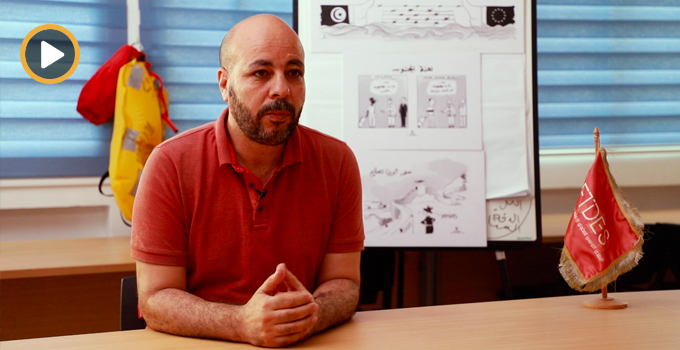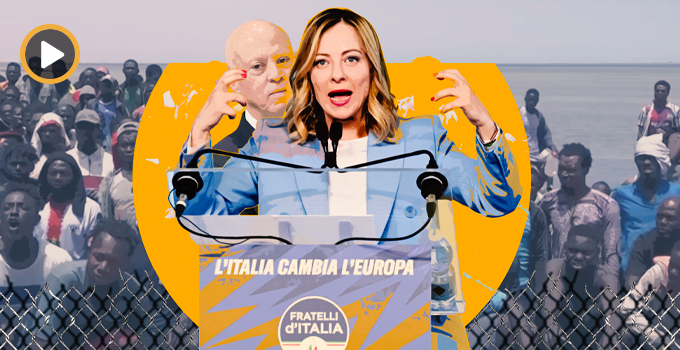
Wednesday, September 27th, 2006
Source : By Sameer Padania, Global Voices
At this site, I’m trying to show videos that show or speak about human rights abuses, and – as in the Tunisian video above – the impact of human rights abuses on ordinary people. I don’t speak Arabic, so how do I know what this video’s about?
It’s thanks to Tunisian activist Sami Ben Gharbia, who this Monday launched Tunisian Prisoners Map, which shows the prisons where a number of political and other prisoners are being held in Tunisia. The site, which — like sites such as ChicagoCrime.org – uses a Google Maps mashup, gives a brief case history for each prisoner, relevant external links, and, where Sami can find it, online video of their families – in the case of the video above it’s Mohamed Abbou. The videos are in Arabic, so I can’t give you more detail (any helpers?), but there’s some background in English in the case histories Sami provides.

Sami, who lives in exile in the Netherlands, talks in an article he posted in French and Arabic of the culture of official secrecy around even the existence of these prisons, the considerable obstacles to finding out more, and the repercussions for those who have requested information from the government. There is no definitive list of civil prisons in Tunisia, and Tunisian Prisoners Map tries to make a dent in that by mapping cases at about 25 detention facilities. You can see some of the prisons in impressive detail if you zoom in, but many of the locations are approximate.
Commenting on the map at nawaat.org, the site Sami runs, Astrubal is pretty scathing about Tunisian bloggers’ reaction to the new site – he says there has not been one mention of the site since it was launched a few days ago, and calls the Tunisian blogosphere the “lobotomisphere“. Bear in mind that, according to some sources, the Tunisian government is currently holding an estimated 350 political prisoners in prisons around the country, and there are regular human rights reports focusing on the treatment and welfare of the prisoners. Something you’d think was a really major topic of interest for Tunisian bloggers, but astrubal seems to be right – when I checked just now, not one of the French or English blogs aggregated at the Tunisian Blogs aggregator mentioned or linked to Sami’s site. I asked Sami by email why he thought this was the case:
I really do not expect to see the so-called “Tunisian bloggers” or Blogosphere talking about this issue. Most of them have chosen the self censorship and have decided to avoid discussing and writing about political content that may hurt the Tunisian regime. They talk about everything except Tunisians’ interior affaires. It is The Taboo of the Tunisian blogosphere. Besides, I’m part of the banned bloggers who do not save the Tunisian regime and who are not recognized as “member” of the Tunisian blogosphere. As the blogger and journalist Wael Abass wrote last week on the Deutsche Presse Agentur: “Sami Bin Gharbia, the Tunisian owner of Kitab.nl, is destined to become a refugee both physically and virtually. He lives in Holland as a political refugee and he is banned from the Tunisian blog aggregator (…) so he took refuge in the Egyptian blog aggregator hosted by Manalaa.net.”Not only we are censored in Tunisia, we have also been censored on the Tunisian blogger aggregator and even on the periodic “Echoes from the Tunisian blogosphere” which is published on Global Voices. They do not hear our “Echoes” only because we write politics! We do understand their fear to talk about those issues, especially those living in Tunisia. Hopefully, they understand our concern to defend our citizenship and rights? Remember, this is the Web! And we are committed to defend this extraordinary tool against the censorship and its passive ally: the self censorship.
As Sami says, those within Tunisia who speak out on human rights live in a climate of fear. During the World Summit on the Information Society, Ethan Zuckerman gave a vivid account of meeting with the Tunisian Human Rights League. Tunisian bloggers may not yet be in a position to create or discuss a site like Sami’s, but according to one site that linked to Tunisian Prisoners Map, users from Tunisian ISPs are clicking through.
As the technology becomes more and more accessible, the more of these kinds of sites will inevitably spring up, pulling together maps, case histories, background research documents, advocacy tools, and, yes, videos, and the simpler it becomes to try to shine a light… I’d be interested to learn of similar initiatives from around the world, so get in touch if you know of one.
In the meantime, Tunisian Prisoners Map is a great attempt to raise debate outside Tunisia about the human rights situation inside the country, and maybe crank up some international pressure on President Zinedine Ben Ali. And while Tunisia’s bloggers may not be trumpeting the site on their blogs, links to Sami’s site from sites such as this help them combat the culture of secrecy and fear that keeps them in silence.




ben ali is very clever dictator ,police corrupt ,prisoners persecuted .electocuted .the man is power crazy pictures of him smiling everywhere ,to make tourist think what a wonderful man this must be ,his wife is greedy ben ali would not know human rights if it bit him on the ass .you will never beat him because he cares only for himself not his people .is this how cruel allah is he has only one man he cares about in tunisia and those that have money .i spit on him .i know this from first hand experience i cannot give my name he cannot hurt me but he can hurt my man